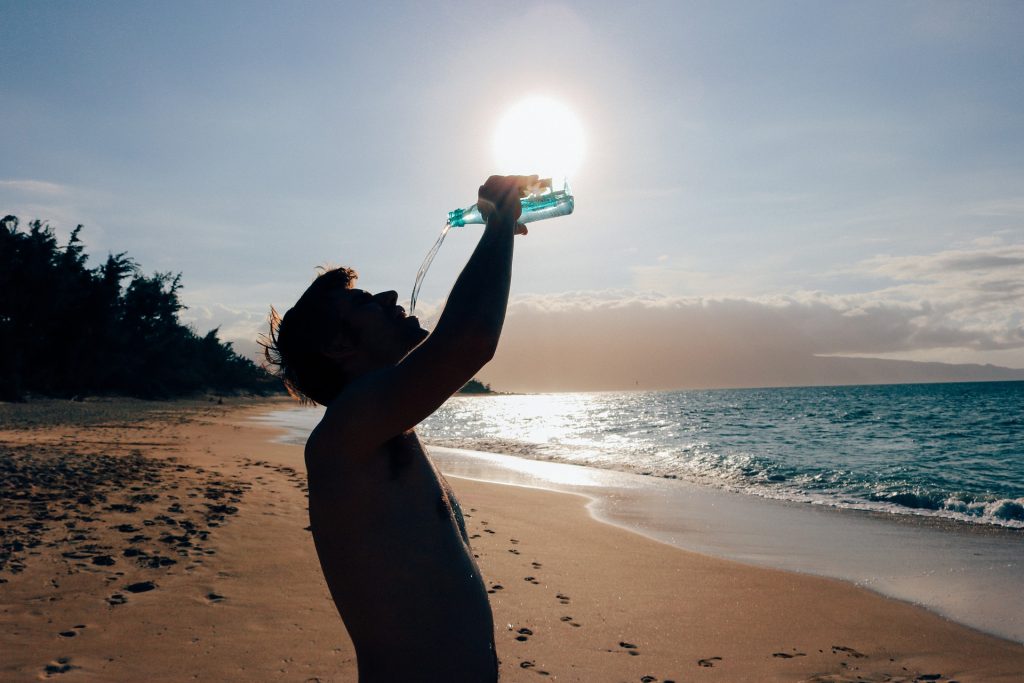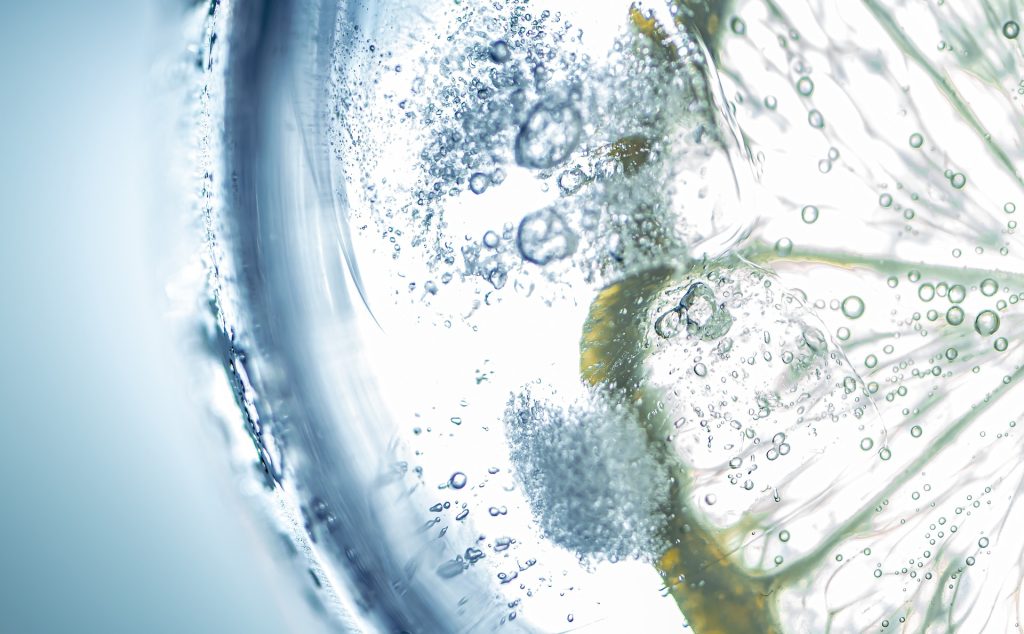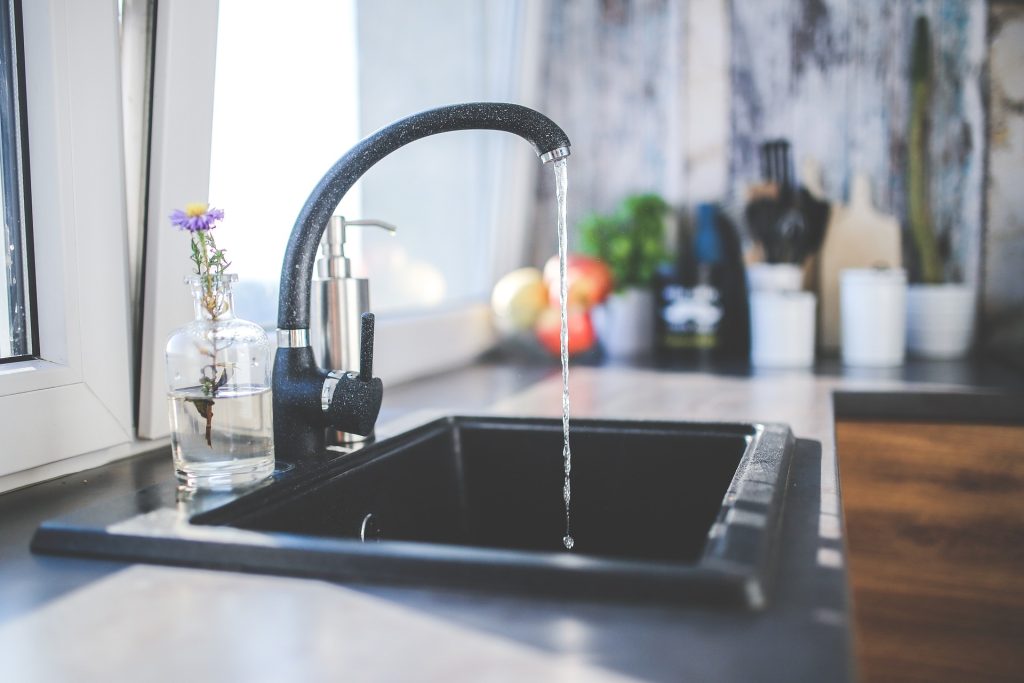
In Australia, we’re blessed with generally good quality tap water, but there are still plenty of reasons to consider using a water filter. From pesky contaminants to simply wanting the purest hydration possible, a good water filter can be a game-changer for your household.
In this guide, we’ll dive into everything you need to know about finding the best water filter in Australia. From understanding different types of filters to our top picks for 2024, we’ve got you covered. So, grab a glass of water (filtered, if you’ve got it!) and let’s get started.
Why You Need a Water Filter in Australia
Tap Water Quality
While Australia’s tap water is generally of high quality and safe to drink, it can vary significantly depending on where you live. Urban areas typically have well-treated water, but rural and remote regions might experience different water quality issues. Factors like old plumbing systems, agricultural runoff, and local environmental conditions can affect the taste, smell, and purity of your tap water.
Common Contaminants
Even though the water supply is treated, there are still common contaminants that can make their way into your drinking water. These include:
- Chlorine and Chloramine: Used in the water treatment process to kill bacteria, these chemicals can leave an unpleasant taste and odour.
- Heavy Metals: Lead, copper, and mercury can leach into the water from old pipes.
- Pesticides and Herbicides: Runoff from agricultural areas can introduce these chemicals into the water supply.
- Microplastics: Tiny plastic particles have been found in water supplies worldwide.
- Fluoride: Added to water to promote dental health, but some people prefer to remove it.
Health Benefits
Using a water filter can provide numerous health benefits, such as:
- Improved Taste and Smell: Removing chlorine and other chemicals can make your water taste and smell much better.
- Reduced Risk of Illness: Filtering out bacteria, viruses, and other pathogens can lower the risk of waterborne illnesses.
- Protection Against Contaminants: Reducing exposure to heavy metals and chemicals can protect your long-term health.
- Better Hydration: When water tastes better, you’re more likely to drink more of it, which is essential for staying hydrated and healthy.
So, while Australia’s tap water is generally safe, adding an extra layer of filtration can provide peace of mind and ensure you and your family are drinking the best quality water possible. In the next section, we’ll explore the different types of water filters available to help you find the perfect fit for your home.
Types of Water Filters
When it comes to choosing a water filter for your home, there are several types to consider. Each has its own set of pros and cons, so it’s important to understand what each one offers. Let’s dive into the most common types of water filters you’ll find in Australia.
Pitcher Filters
Pitcher filters are one of the most convenient and affordable options available. They work by filtering water as you pour it from the tap into the pitcher. The water passes through a replaceable filter cartridge that removes contaminants.
- Pros: Easy to use, affordable, portable, no installation required.
- Cons: Limited capacity, slower filtration rate, filters need frequent replacement.
Under Sink Filters
Under sink filters are installed directly under your kitchen sink and connected to your cold water line. They provide filtered water through a separate faucet or your main tap, depending on the system.
- Pros: High filtration capacity, filters a wide range of contaminants, doesn’t take up counter space.
- Cons: Requires installation, more expensive than pitcher filters, filters need periodic replacement.
Whole House Filters
Whole house filters treat all the water entering your home, ensuring that every tap provides filtered water. These systems are typically installed at the main water line.
- Pros: Filters all water in the house, protects plumbing and appliances, handles large volumes of water.
- Cons: High initial cost, requires professional installation, maintenance can be complex.
Countertop Filters
Countertop filters sit on your kitchen counter and connect directly to your faucet. They filter water as it flows through the system, providing easy access to filtered water without any major installation.
- Pros: Easy to install, portable, doesn’t require modifications to plumbing.
- Cons: Takes up counter space, may not filter as thoroughly as under sink or whole house systems.
Each type of water filter has its unique benefits and drawbacks, so it’s important to choose one that best fits your household needs and budget. Up next, we’ll highlight our top picks for 2024 to help you narrow down your choices.
Top Picks for 2024
Choosing the best water filter can be overwhelming, so we’ve done the hard work for you. Here are our top picks for the best water filters in Australia for 2024, catering to various needs and budgets.
Best Overall Water Filter
Berkey Big Berkey Water Filter
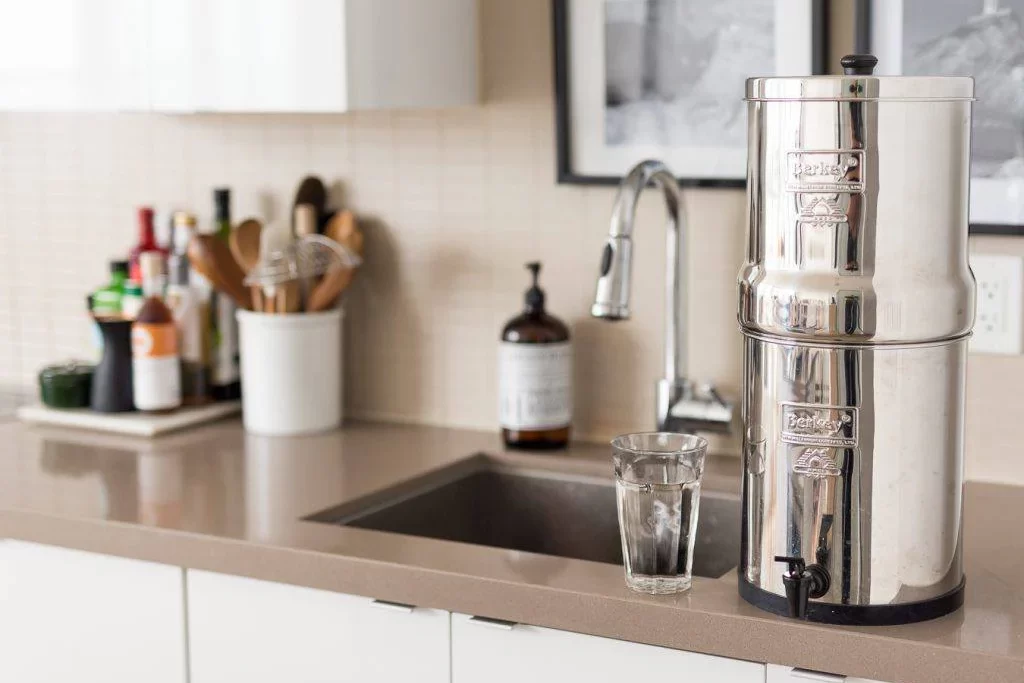
What We Liked
- High capacity – Ideal for larger households
- Taste and quality of the filtered water
- Portable
- Looks great!
What We Didn’t Like
- Filters are pricey (but they do last)
- The plastic spigot (we’d upgrade to the metal one)
- Instructions are not very clear
- A little fiddly with the initial set up
The Big Berkey system is incredibly versatile and ideal for small to medium-sized families. Whether you’re using it at home, taking it on a camping trip, or preparing for emergencies, this powerful filter has got you covered.
Perfect for Any Water Source
The Big Berkey can purify both treated and untreated water. It’s great for filtering water from remote lakes, streams, stagnant ponds, or even in places where the water supply might be questionable. This makes it perfect for everyday use, outdoor adventures, and even during power outages or situations where clean water isn’t readily available.
Comprehensive Filtration
This system is designed to remove all sorts of contaminants, including:
- Pathogenic bacteria, cysts, and parasites
- Harmful chemicals like herbicides, pesticides, VOCs, organic solvents, radon 222, and trihalomethanes
- Nitrates, nitrites, and heavy metals like lead and mercury
It’s so powerful that it can even remove food colouring from water without stripping away the beneficial minerals your body needs. This level of performance is hard to beat!
Durable and Efficient
Made from polished 304 stainless steel, the Big Berkey is both durable and stylish. It comes with four purification elements and uses the latest technology to ensure you get the cleanest water possible. The system has a storage capacity of about 8.5 litres (2.25 gallons) and can purify up to 13.3 litres (7 gallons) per hour when fully configured.
Compact and Portable
For convenience, the upper chamber nests within the lower chamber, reducing its height to just 33 cm (13 inches) for transport. When in use, it stands at 49 cm (19.25 inches) tall with a diameter of 21.5 cm (8.5 inches).
The Big Berkey is truly a versatile and powerful water filtration system, perfect for ensuring you and your family always have access to clean, safe drinking water.
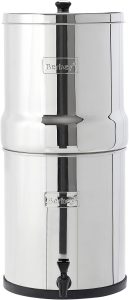
Berkey Big Berkey Water Filter
$617.50 | Amazon
- Filtration Capability: The Berkey Big Berkey is a powerful gravity-fed water filtration system that can remove over 200 contaminants, including heavy metals, bacteria, and viruses. It’s ideal for both everyday use and emergency situations.
- Pros: No electricity required, long-lasting filters, and highly portable. The stainless steel design is durable and can filter up to 22.7 litres per day.
- Cons: Higher upfront cost, and the larger size may not be suitable for smaller kitchens or tight spaces.
- Available at:Berkey Australia and Amazon
Best Budget Water Filter
Brita Marella Water Filter Jug
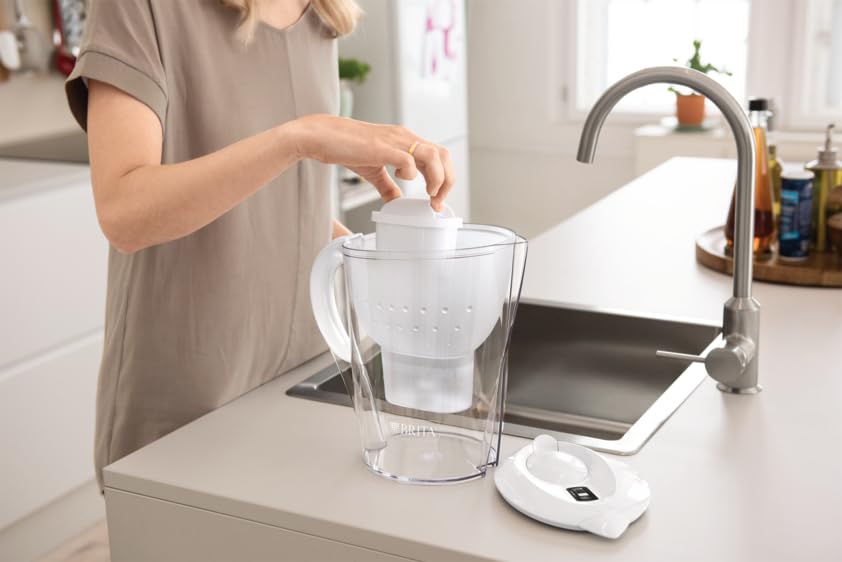
What We Liked
- Affordable
- Easy to use
- Fits in your fridge
- Won’t break the bank
What We Didn’t Like
- Limited capacity
- Filters need replacing more frequently
- Instructions are not very clear
BRITA water filters are renowned for their ability to transform tap water into a healthier, more refreshing beverage. By leveraging advanced technology, BRITA filters efficiently remove impurities, chlorine, and undesirable tastes from your tap water, ensuring each sip is crisp and delightful. This not only enhances your hydration experience but also encourages you to drink more water.
Top Benefits of BRITA Water Filters
- Sustainability: BRITA is committed to reducing single-use plastic waste. Using a BRITA filter means fewer plastic bottles end up in landfills.
- Trusted Quality: BRITA’s reputation for quality and innovation makes it a top choice for water filtration.
Elevate your water drinking, promote sustainability, and enjoy the purest water with BRITA filters.
Features of the BRITA Marella Water Filter Jug
- 3.5 Litre Capacity: Perfect for families or frequent water drinkers.
- Ergonomic Design: Includes a flip-top lid and contoured handle for easy use.
- Filter Change Indicator: Integrated to remind you when it’s time to replace the filter.
- Includes Four MAXTRA+ Filters: Ensures you have a fresh supply of clean water.
- Efficient Filtration: Effectively removes impurities from tap water.
The Marella Water Filter Jug is compatible with both the BRITA MAXTRA+ Filter and the MAXTRA+ Limescale Filter. For optimal performance, replace your BRITA filter once a month or every 150 litres.
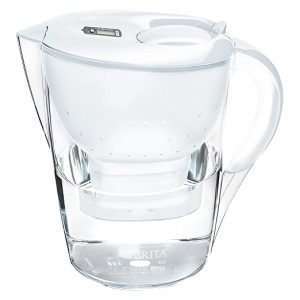
BRITA Marella Water Filter Jug
$69.00 | Amazon
- Filtration Capability: The BRITA Marella Water Filter Jug is a compact and convenient option that reduces chlorine, limescale, and other common tap water impurities. It’s designed for everyday use, particularly in households where space is limited.
- Pros: Affordable, easy to use, and fits easily in most refrigerator doors. The Maxtra+ filter cartridges are widely available and replaceable.
- Cons: Limited filtration capabilities compared to more advanced systems, requiring frequent filter changes (every 4 weeks).
- Available at: BRITA Australia and Amazon.
Best for Health-Conscious Individuals
iSpring RCC7AK 6-Stage Under Sink Reverse Osmosis Drinking Water Filter System
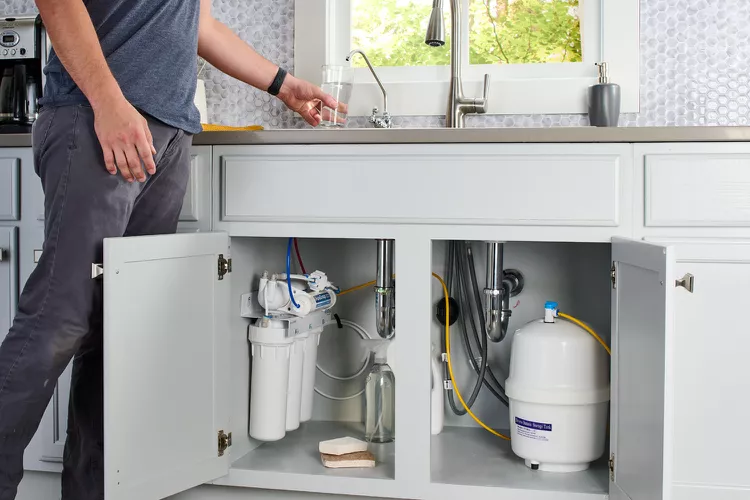
What We Liked
- Taste and quality of the filtered water
- Great customer service
- Easy to install
- Filters 1,000+ water pollutants
What We Didn’t Like
- Takes up most of one side under your sink
- Some people have reported issues with faucet the leaking
The iSpring RCC7AK combines reverse osmosis and alkaline remineralisation, providing ultra-pure water while adding healthy minerals back in. It features six filtration stages, including a carbon block filter and a UV filter.
Why It’s Great: Perfect for health-conscious individuals, it not only removes harmful contaminants but also enhances the water’s taste and health benefits.
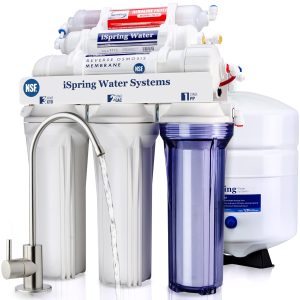
iSpring RCC7AK 6-Stage Under Sink Reverse Osmosis Drinking Water Filter System
$569.18 | Amazon
- Filtration Capability: The iSpring RCC7AK offers comprehensive filtration through its 6-stage reverse osmosis system, removing up to 99% of over 1,000 contaminants, including lead, chlorine, and fluoride. It also includes a remineralisation stage to add healthy minerals back into the water.
- Pros: Provides extremely clean and pure water, long-lasting filters, and high water output. The remineralisation stage ensures better-tasting water.
- Cons: Installation can be complex and may require professional help. It also requires space under the sink and some maintenance.
- Available at:iSpring Water Systems Australia and Amazon.
These top picks cater to different needs, from budget-friendly options to high-performance systems for health enthusiasts. In the next section, we’ll guide you through choosing the right water filter for your specific needs and preferences.
How to Choose the Right Water Filter for Your Home
Selecting the perfect water filter can seem daunting, but it doesn’t have to be. Here are some key factors to consider to ensure you choose the right one for your home.
Assess Your Needs
The first step in choosing a water filter is understanding your specific needs. Here are a few questions to ask yourself:
- What contaminants are present in your water? Consider getting a water testing kit to identify specific issues.
- How many people are in your household? Larger households may need higher capacity filters.
- Do you need filtered water for drinking only or for the entire house? This will help determine if you need a point-of-use filter (like a pitcher or under sink) or a point-of-entry system (whole house filter).
Check out this post: Should I Buy a Water Filter.
Consider Your Budget
Water filters come in a wide range of prices. Here’s a general idea of what to expect:
- Pitcher Filters: $20 – $50
- Under Sink Filters: $100 – $500
- Whole House Filters: $500 – $2,000+
- Countertop Filters: $50 – $300
Think about your long-term investment. While some filters have a higher upfront cost, they might save you money in the long run with fewer filter replacements or lower maintenance costs.
Check Certifications
Always look for filters that have been certified by reputable organisations. Certifications ensure that the filter has been tested and proven to remove specific contaminants. Key certifications to look for include:
- NSF/ANSI Standards: These standards cover a variety of water treatment technologies and contaminants.
- Water Quality Association (WQA): Certification from WQA indicates the product meets industry standards.
User Reviews and Ratings
Before making a purchase, read user reviews and ratings. These can provide valuable insights into the real-world performance of the filter. Look for reviews that mention:
- Ease of installation
- Filter lifespan and replacement costs
- Customer service experiences
- Overall satisfaction
You can find user reviews on retailer websites, forums, and independent review sites. Websites like ProductReview.com.au can be particularly helpful for Australian consumers.
Additional Features
Consider additional features that might be important to you:
- Filter lifespan indicators: Some filters come with indicators that alert you when it’s time to replace the filter.
- Flow rate: Make sure the filter provides enough water flow for your needs, especially if you’re considering a whole house system.
- Maintenance requirements: Check how easy it is to maintain the filter and replace parts.
By carefully considering your specific needs, budget, certifications, user reviews, and additional features, you can find the perfect water filter to ensure clean and safe drinking water for your home. In the next section, we’ll provide some installation and maintenance tips to help you get the most out of your new water filter.
Installation and Maintenance Tips
Once you’ve chosen the perfect water filter, the next step is installing it and ensuring it runs smoothly. Here are some tips for installation and maintenance to help you get the most out of your new water filter.
DIY vs Professional Installation
DIY Installation: Many water filters, especially pitcher and countertop models, are designed for easy DIY installation. Under sink filters can also be installed by handy homeowners with basic plumbing knowledge.
Professional Installation: Whole house filters and some complex under sink systems might require professional installation. Hiring a professional ensures the job is done correctly and can help avoid potential issues down the line.
Tips for DIY Installation:
- Read the Instructions: Always read the manufacturer’s installation manual thoroughly before starting.
- Gather Tools: Ensure you have all necessary tools on hand, such as wrenches, screwdrivers, and Teflon tape.
- Watch Tutorials: Look up YouTube tutorials for visual step-by-step guidance.
Maintenance Tips
Regular maintenance is crucial to keep your water filter working efficiently. Here are some general tips:
- Replace Filters on Time: Follow the manufacturer’s recommendations for replacing filter cartridges. Overused filters can become less effective and even contaminate your water.
- Clean the System: For systems like pitcher and countertop filters, clean the reservoir and other components regularly to prevent build-up of contaminants and bacteria.
- Check for Leaks: Periodically inspect your filter system for any leaks or drips. Tighten connections if necessary and replace worn-out parts promptly.
- Monitor Water Quality: Use water testing kits to periodically check the quality of your filtered water. If you notice any changes in taste, odour, or appearance, it might be time to replace the filter or check the system.
- Keep an Eye on Water Pressure: Reduced water pressure can indicate a clogged filter. Check the filter and replace it if necessary.
Common Issues and Solutions
Even with proper maintenance, you might encounter some common issues. Here’s how to troubleshoot them:
- Low Water Flow: This can be caused by a clogged filter. Replace the filter cartridge to restore normal flow.
- Strange Taste or Odour: If your filtered water starts to taste or smell unusual, it could be due to an overused filter. Replace the filter and clean the system.
- Leaks: Check all connections and seals. Tighten any loose fittings and replace any damaged parts.
- No Water Flow: Ensure that the water supply is turned on and that there are no kinks in the hoses. Check the filter for clogs and replace if necessary.
- Cloudy Water: This can happen if air gets trapped in the system. Run water through the filter for a few minutes to clear any air bubbles.
By following these installation and maintenance tips, you can ensure your water filter continues to provide clean and safe drinking water for your home. In the next section, we’ll answer some frequently asked questions to address any lingering concerns you might have.
FAQs
How often should I replace my water filter?
The replacement frequency depends on the type of filter and the manufacturer’s recommendations. Generally, pitcher filters need replacing every 2-3 months, while under sink and whole house filters can last 6-12 months. Always refer to your filter’s manual for specific guidelines. Regular replacement ensures optimal performance and water quality.
Can I install a water filter myself?
Yes, many water filters are designed for easy DIY installation, especially pitcher and countertop models. Under sink filters can also be installed by handy homeowners with basic plumbing skills. However, whole house filters and complex systems may require professional installation to ensure proper setup and avoid potential issues.
What is the best water filter for hard water?
For hard water, a whole house water filter with a built-in water softener or a separate water softener system is ideal. The Aquasana EQ-1000 Whole House System, for example, can handle hard water effectively. It’s designed to reduce scale buildup, which is a common issue with hard water.
Do water filters remove fluoride?
Not all water filters remove fluoride. If fluoride removal is a priority for you, look for filters specifically designed for this purpose, such as reverse osmosis systems or filters with activated alumina. The iSpring RCC7AK is an excellent option for fluoride removal.
How do I know which contaminants are in my water?
The best way to determine the contaminants in your water is by using a water testing kit or sending a sample to a certified laboratory. Testing your water can identify specific issues like heavy metals, chlorine, bacteria, and more. This information will help you choose the right filter to address your water quality concerns.
Are water filters environmentally friendly?
Water filters are generally more environmentally friendly than bottled water because they reduce plastic waste. Many filter cartridges are also recyclable. However, it’s essential to dispose of used filters properly and choose brands that prioritise sustainability.
By addressing these common questions, we hope to clear up any doubts and help you make an informed decision about your water filtration needs. If you have any more questions, feel free to reach out or leave a comment below! Up next, we’ll wrap up with a summary and final recommendations.
Conclusion
In summary, finding the best water filter in Australia depends on your specific needs, budget, and household size. We’ve covered a range of options, from affordable pitcher filters to comprehensive whole house systems, each with its own set of benefits.
- For a top-notch overall filter, the Berkey Big Berkey Water Filter stands out with its high capacity and excellent filtration capabilities.
- If you’re on a budget, the Brita Marella Water Filter Jug offers great value without compromising on quality.
- For health-conscious individuals, the iSpring RCC7AK provides ultra-pure water and adds essential minerals back in, ensuring you get the best health benefits.
Choosing the right water filter can significantly improve your water quality, making it safer and more enjoyable to drink. Remember to consider your specific needs, check for certifications, and read user reviews before making a purchase.
For more tips, reviews, and updates on water filters, be sure to sign up for our newsletter. Stay hydrated and enjoy the benefits of clean, filtered water!

